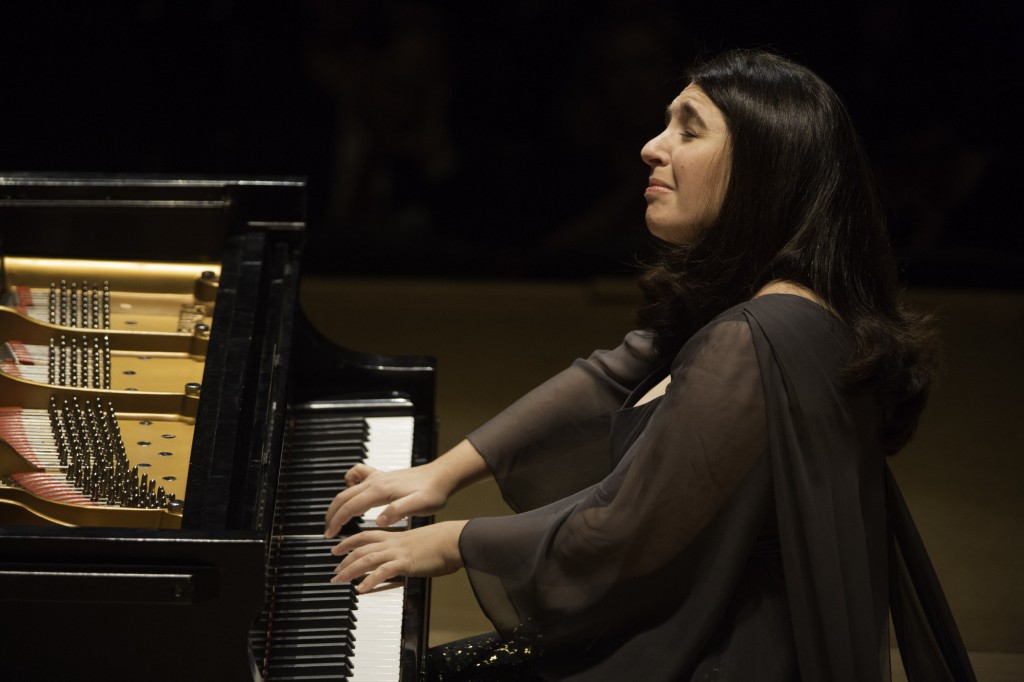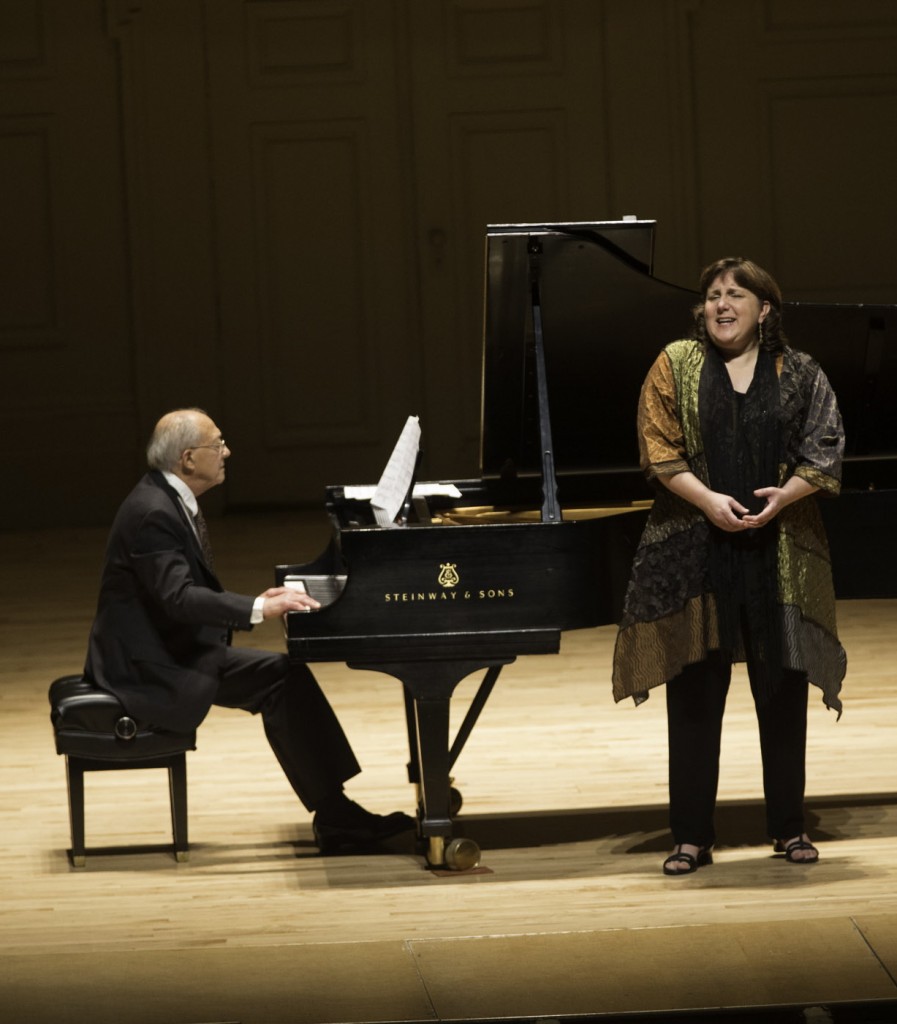Dinnerstein and Upshaw captivate with glowing performances in Terezín gala

Simone Dinnerstein gave the world premiere of Nico Muhly's "You Can't Get There from Here" Monday night at the Terezin Music Foundation. Photo: Michael J. Lutch
The mists of memory swirled thick in Symphony Hall Monday night as soprano Dawn Upshaw and pianists Gilbert Kalish and Simone Dinnerstein, among others, graced the annual gala of the Terezín Music Foundation with rapt, dreamlike performances of music by Ives, Schumann and Bach, plus a vibrant world premiere by Nico Muhly.
This foundation, named for the infamous concentration camp where the Nazis sent writers and musicians, is all about memory, having been founded in 1991 to promote the music of composers who died in the Holocaust.
It now also supports promising young composers of today—hence the Muhly premiere, a brilliant piece for piano solo titled You Can’t Get There from Here.
The contemplative atmosphere began to gather before the music even started, as gala attendees filed into the dimly-lit hall, and took seats near the front, looking at a few chairs, music stands, and a piano that had been brought to the front of the stage.
The chairs and stands were for violinist Si-Jing Huang and cellist Sato Knudsen, who launched the concert with a sonorous, impassioned performance of a Duo by Gideon Klein, composed in Prague in 1941. Klein’s clear, melodious counterpoint exemplified twelve-tone writing at its most expressive. The second movement, a sensuous and lyrical lament, ended abruptly on a descending figure in the violin.
In the welcoming remarks that followed, Mark Ludwig, a Boston Symphony Orchestra violist and executive director of the Terezín Music Foundation, explained that the Duo was an unfinished work that Klein had entrusted to a friend for safekeeping before he was transported to Terezín (Theresienstadt), where he actively promoted musical composition and performances before his eventual removal to Auschwitz. The Duo was discovered in a cache of his compositions in 1990.
The familiar story of the Yankee farmer who, asked by a lost motorist for directions, replies “You can’t get there from here” is presumably the source of the title for the new piece by Nico Muhly, which the composer described in a program note as “a navigation challenge for Simone Dinnerstein.”
The piece, commissioned by the Terezín Music Foundation and dedicated to Holocaust survivor and educator Bela Kalman, does demand a lot of imagination and free association from the performer as it jumps from idea to idea. Its sections of chugging, minimalist music go round and round like that disoriented motorist before leaping into something entirely different—a recitative, say, or a bell-like passage, or a bit of flamenco.
Having taken a break offstage following her preceding gauzy performances of Schumann and Bach, Dinnerstein returned seemingly a different pianist, attacking Muhly’s motoric chordal writing with gusto. Switching gears every minute or so during this fairly lengthy piece, she not only navigated the score successfully but also brought out the composer’s ingenious exploration of the piano’s registers and sonorities.
With its ever-changing stream of attractive ideas and its deep understanding of the instrument, Muhly’s piece produced a sensation not unlike listening to Chopin’s Twenty-Four Preludes, Op. 28—a work that, by the way, one wouldn’t mind hearing this imaginative pianist play some time.
Earlier in the program, a sense of long-ago loss, evoked by Klein’s fragmentary Duo, colored the performances that followed it.

Dawn Upshaw performed songs of Charles Ives with pianist Gilbert Kalish at the Terezin gala concert. Photo: Michael J. Lutch.
The songs of Charles Ives lend themselves to a wide variety of interpretations, and Upshaw and Kalish took every opportunity to wrap their six-song set in a nostalgic glow. (The sassy urban vignette Ann Street was the delightful exception.)
Upshaw drew in the audience with that intimate, conversational style of which she is the master, letting fly only the occasional high note to remind listeners what a large, dark space they were sitting in, and how she could fill it if she chose. Her subtle inflection, catching every nuance of image and mood, was matched by Kalish at the piano, which seemed hardly to have hammers at all, enveloping the voice, resonating to it, and entwining bits of melody with it.
Highlights of the Ives set included the intensely expressive pianissimo of Tom Sails Away, the sudden passion that leaped off the impressionistic canvas of The Housatonic at Stockbridge, and the fragile memory of a parlor song and a hymn tune in Down East.
Dinnerstein also seemed to have her memory glasses on for Schumann’s Kinderszenen (Scenes from Childhood), Op. 15, a piece that often gets a sort of wide-eyed, naïve treatment, but not here. With tone ranging from wispy to buttery, but rarely hard-edged, the pianist took most of the brief pieces at a fast clip, like a fleeting and indistinct memory of something very exciting—which, after all, is the way children experience things.
Exceptions included a “Pleading Child” who seemed somewhat too laid-back at his slow tempo; the concluding movement, in which “The Poet Speaks” very, very deliberately; and most glacial of all, the famous “Träumerei” (Dreaming), which could serve as the theme song for this commemorative event, especially in Dinnerstein’s mostly pianissimo rendering, which was beautifully phrased and sustained despite being attenuated almost to the vanishing point.
Is it possible to scandalize anyone with a Bach performance any more? Not too long ago, Dinnerstein’s lush rendering of the Partita No. 1 in B-flat major, BWV 825, ripe with pedal and swooning with rubato, would have had Bach purists reaching for the smelling salts. But on this evening, it fit right in. These allemandes and sarabandes were not dances, or even dances exalted by art, but memories of how a dance felt at some point far in the past.
As before, the exception proved the rule: The first Minuet stepped along simply, right in time, and very prettily too. But Minuet II, pianissimo and beyond pianissimo, nearly vanished like “Träumerei,” and the concluding Gigue was hardly a wake-up call, its toccata-like figurations burbling gently in this performance like a bit of Debussy water music.
terezinmusic.org; 857-222-8262.
Posted in Performances




